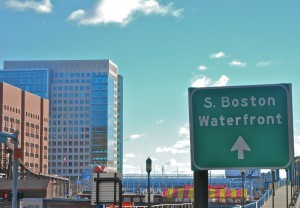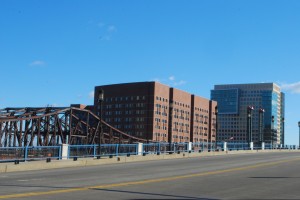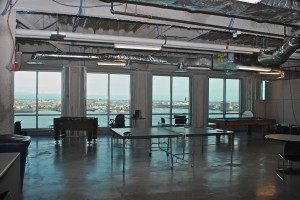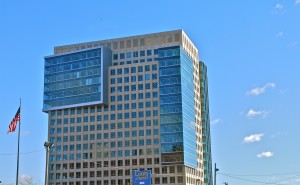 This week we’re continuing with part 2 of the 3 part series on The MassChallenge Story. If you would like to catch up , check out The Mass Challenge Story [Part 1]. When we last left off, John Harthorne, CEO and co-founder of MassChallenge, and Akhil Nigam President and co-founder, had just secured initial funding and changed their business model to a non-profit. In part 2 of this story Harthorne tells us the story of how MassChallenge ended up at their offices at the Fan Pier on the Boston Waterfront and the overwhelming amount of support they received from the Boston area.
This week we’re continuing with part 2 of the 3 part series on The MassChallenge Story. If you would like to catch up , check out The Mass Challenge Story [Part 1]. When we last left off, John Harthorne, CEO and co-founder of MassChallenge, and Akhil Nigam President and co-founder, had just secured initial funding and changed their business model to a non-profit. In part 2 of this story Harthorne tells us the story of how MassChallenge ended up at their offices at the Fan Pier on the Boston Waterfront and the overwhelming amount of support they received from the Boston area.
MassChallenge had just secured their first $350K in grants from investors, and was putting the finishing touches on reshaping their business model. I asked Harthorne his thoughts on comparing his business model to the West Coast model of TechStars and Y-Combinator: “Our original business plan was to be for profit, and there would be an equity stake involved,” says Harthorne. “But what we realized was that ultimately that model is broken. Paul Graham at Y-Combinator and TechStars can pull it off for a couple reasons and I mean them no harm in saying this, but ultimately I think those are doomed models. Ultimately our model, although it doesn’t necessarily have to be us, will supersede theirs.”
“Every industry has its value chain, and in the world of startups all of the value creation begins with the startup,” Harthorne explains. “That’s the key to the whole equation, without that startup there’s no spark. You have to have that young idea or that crazy innovator; it’s the startup that creates the value. If that’s the key to the equation, their price should be zero. In fact, you should be catering to them because if you attract them…than everybody else will show up. So if I can say I have the hundred best startups in the world on this floor, the lawyers and investors will be pushing each other out of the way to get on to that floor. While if I told you I had a hundred of the best lawyers on this floor…nobody would care! The unique element in the ecosystem is the startup itself. Once you realize that, you don’t take any equity from them because if you set a price, the startup is forced to make a decision: is this price fair? And is it appropriate or not? If you tell me that you’ll give me $15K in return for 6% equity in my company, then I just have to quickly do the math and say, ‘what’s that valuation? Do I think I am worth more or less than that? ‘ Obviously Y-Combinator and Techstars provide additional benefits on top of the money…but we provide exactly those same benefits: almost exactly the same list of mentors, almost exactly if not more value than they can provide. So as a startup if you look at those three models, you’d say ‘well I’d much rather go to MassChallenge.’ And if we then continue to get the smartest, best startups…the very best, the top of the pile startups…then everybody else will show up and the model works. Essentially, we can finance the non-profit through the other players that are willing to pay an access fee.”
With the business model, and financing secured Harthorne and Nigam began searching for a location. They felt that about 80% of the activity of the state is east Massachusetts in the Cambridge and Boston areas. Although there are pockets of excellence elsewhere in areas like Waltham, Worcester, and others, they realized the bulk of the action is out east.

“We were working in the Cambridge Innovation Center, so I envisioned logically that we would end up in Kendall Square,” Harthorne said. “However, the Mayor [Mayor Menino] and the people on his staff were so eager and aggressive at landing us here [Fan Pier], and they’ve proved to be really good partners. They get stuff done, they move really quickly, any sort of need we had…boom they solved it very very quickly!”
Interestingly enough, the two founders weren’t originally planning on seeking any office space. However, after a little while in operation it became evident that they could. They had made their way onto the cover of the Boston Business Journal, and began to have a few articles published about the company after the Governor made the announcement regarding their funding. “After that, some real estate people started contacting us,” Harthorne explains. “They would contact us and say ‘hey are you looking for real-estate?’ to which I responded ‘we don’t have the money for real-estate!
I’d love an office but we have zero dollars, can you give me a free office?’ As a joke…literally as a joke. To which they responded, ‘well actually… there’s a lot of empty warehouses, what kind of stuff are you looking for?’ We were like…seriously?” With the economy bottoming out, it turns out there had never before been so much empty real estate on the market in Massachusetts. Thus the calls started pouring in from agents asking Harthorne what his needs were. Harthorne and Nigam got to work immediately assessing their needs and outlining how best to integrate them into their plan. “So we started to look way down out on the dry docks at the very end of the Seaport,” says Harthorne. “They had agreed to give us a floor for free, but we would have to cover monthly expenses…which are actually pretty significant for a big space. Turns out it was going to cost us $15K a month. Once again, I explained ‘we have zero dollars, so that’s not really an option.’ If it was a $1,000 dollars a month we could find a way to pay for it, but there was no way we were going to pull off $15K.”
After that meeting, Harthorne headed to another non-real estate related meeting at Boston World Partnerships. “I told them about the office space, and said ‘it’s too bad!’ The place was a little far away, but had a great startup feel to it,” regales Harthorne. I explained to them that I simply couldn’t afford the monthly expenses, since we literally have zero dollars. It was at that moment that Dave McLaughlin started grilling me about all of our real estate needs: how many square feet do you need, how many people, how many months, what would you do with it? Having never been in this situation before it left me with a lot to ponder.”
As Harthorne continued to ponder the many questions McLaughlin had put forth, he received a call from Joe Fallon, CEO and President of The Fallon Company.

Fallon oversees the development and investment operations of the company’s real estate portfolio, which includes some of the most sought-after residential, hotel, and commercial properties in Boston, including the Fan Pier. Fallon spoke quickly on the phone to Harthorne, “he said, ‘come down here [Fan Pier] I think I have a solution for your office space needs.” Harthorne headed down to the Fan Pier to find Fallon waiting for him in the lobby. “He took me up to the 13th floor, we looked around and it was all raw, there were no walls…nothing, it was completely open,” describes Harthorne. “He asked me about my needs, and he said, ‘I think we can make this work, do we have a deal?’ My response was, ‘are you kidding? What are you talking about?’ I was totally thrown off. He made it almost impossible to say no. I explained to him we had three other deals and we have to circle back to them. He responded, ‘well my deal stands…I’m on the table first. I’m ready to sign it tomorrow if you want to.’ We kept going back to him with things like, ‘well we don’t really have any furniture.’ Fallon responded quickly with, ‘I’ll buy your furniture, what else do you need?’ He just kept making it so easy, that we simply couldn’t say no to this unbelievable deal.”
While they were still deciding, Harthorne received a call from the Mayor’s Chief of Staff Mitch Weiss. Before Harthorne could even process things fully, Mayor Menino’s voice sounded through the phone. The Mayor said, “listen John, in Cambridge you’ll be one in a thousand.

But down here you’ll be really special to us. I just wanted to let you know we want you in Boston, we’ll take care of you. You let me know what you need, and we’ll make sure you get it. I hope to see you down on the Boston Waterfront, do we have a deal?” John got off the phone and thought to himself, “we can’t not do this. From that point on it was an easy decision.”
Stay tuned for part 3, the final part of this 3 part series on the MassChallenge.
